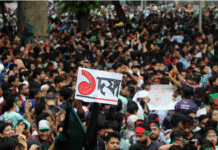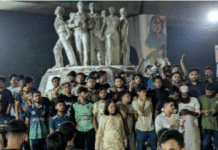Sadeq Khan
Fifteen years into the new millennium, the world order appears fraught with paralytic parts, muscular fatigue, and even gangrenous extremities. Otherwise robust as a developing country, Bangladesh is also long-suffering from a chronic disorder of political paralysis. Since the country managed to prevent contamination of the gangrene of international terrorism, disturbing events that are systematically carrying on eroding and destroying moral and material fibres of this nation are only cursorily being reflected in the powerful electronic focus of the world media.
The global print media and rights groups, however, are more solicitous. Amnesty International, Human Rights Watch, Transparency International, UNHCR as well as Western capitals and parliaments all had words of caution about the derailment of democracy and denial of fundamental rights in Bangladesh, on the one hand by violent political programmes and on the other by police state practices, killing and maiming activists and innocents alike by the opposition’s “petrol bomb culture” and the government’s “crossfire culture”. They advocated restraint and dialogue. Tolerance and Compromise is the name of the game, they said. But who listens? Or, who could bell the cat to make both sides listen?
Personal vendetta at country’s expense
The BANYAN column of the British journal The Economist had an answer, albeit an uncertain answer. In the February 2 issue of the magazine, Banyan explained: “Bangladesh suffers a dysfunctional two-party system, in which the two party leaders, the battling begums, wage a personal vendetta at the country’s expense. From 1991 they have rotated in office. Because both parties know that the other will rig elections, polls used to be conducted under an interim caretaker administration. In 2006 Mrs Zia’s party, at the end of a particularly corrupt and incompetent stint in office, tried to rig that system too. The army stepped in to back a non-party “technocratic” government, which after two years held an election won in a landslide by Sheikh Hasina’s Awami League. The party has used its majority to entrench its power, and make it impossible for the BNP ever to win an election: by abolishing the caretaker system, hounding its leaders and (virtually) banning its largest coalition partner, Jamaat-e-Islami, for its avowedly Islamic platform. Now the government claims it is combating acts of vandalism and terrorism by the BNP. The opposition accuses the government of trying to create a one-party state. Both sides have a point.
The personal animus between the begums has helped foster a winner-takes-all approach to politics in which the futility of rigged elections forces the opposition on to the streets. Both parties are entrenched across the country; attempts, during the technocratic interregnum, to encourage “third forces” to emerge to challenge them proved fruitless. Bangladesh’s neighbours are (now?) unable and perhaps unwilling to meddle in the political deadlock. Despite everything, the country has a fair record of developmental success. And India and the West distrust Mrs. Zia, seeing her as both willing to allow China a greater role in the country (?) and as being soft on Islamist extremism. Sheikh Hasina likes to point out that on her watch no big terrorist attack has taken place in Bangladesh. Nor has one elsewhere been traced back to the country.
Time out on political brawl
However, with the BNP’s transport blockade prompting growing unrest, and victims of arson attacks filling the burns units of hospitals, the climate of repression worsening, the army may feel compelled to intervene. Mindful of its reputation (and lucrative UN peacekeeping duties), it will be wary of an outright coup. But it seems highly unlikely the government can be persuaded to treat the unrest as a political crisis and call fresh elections. So the generals may feel, as they did eight years ago, that they have no option other than to call “time out” on a political brawl that neither side can win.”
Banyan also observed: “Nearly 50 people have been killed and more than 10,000 opposition activists arrested. BNP leaders are mostly in jail, in exile or in hiding, and face criminal charges that will probably bar them from running in the next election. This week events appeared to be reaching a head. The government temporarily cut the electricity supply and internet cables to Mrs Zia’s redoubt. In addition to the crippling blockade, she called a three-day national strike (later extended for the whole working week of five days) from February 1st. Why has politics degenerated into this mess?”
It is an answer to the last question that the nation must seek, not just a stopgap of a transitional escape route by military takeover or civic compromise.
Source: Weekly Holiday









